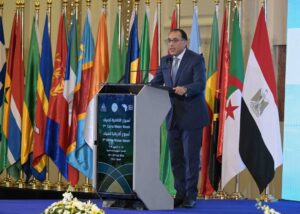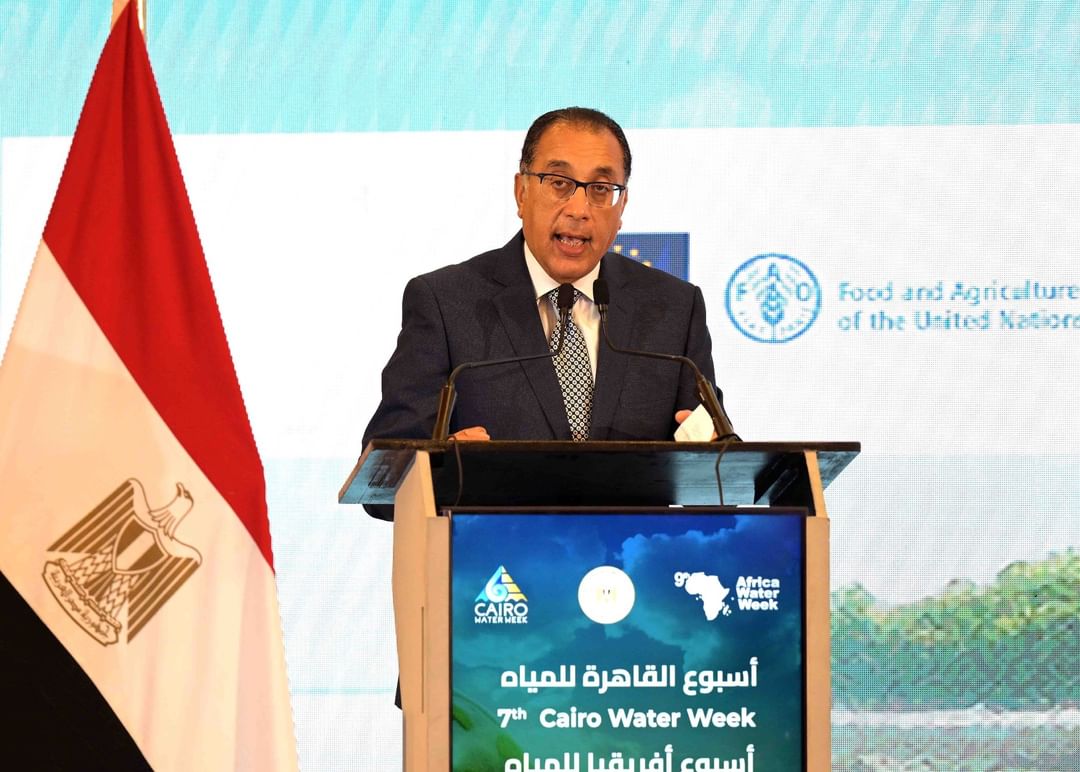The Prime Minister participates in the opening session of the seventh Cairo Water Week and the ninth African Water Week

The Nile Basin Initiative in its original consensual form, which was established on it, will remain the only comprehensive mechanism representing the entire Nile River Basin
There are risks resulting from unilateral and unilateral actions that do not comply with the principles of international law on the common river basins, the most prominent of which is the Ethiopian dam
Unilateral non-cooperative operation of the Ethiopian dam may lead to serious consequences if such practices continue in conjunction with prolonged droughts
The Egyptian state strives to implement a comprehensive national plan that addresses issues related to water, energy, food and the environment in order to improve the management of Water Resources
The occupation in the Palestinian territories in the Gaza Strip is working to prevent access to water, energy and food as a tool of pressure and control and as a means of war
The ongoing war in Sudan for more than a year and a half has exacerbated the suffering of citizens, which has caused unprecedented human suffering due to the difficulty of providing water

Dr. Mostafa Madbouly, prime minister, participated this morning in the opening session of the events of the “seventh Cairo Water Week” and the”ninth African Water Week”, held under the auspices of His Excellency President Abdel Fattah al-Sisi, president of the Republic, in the presence of a large number of government ministers, as well as a number of African ministers, the president of the World Water Council, a number of ambassadors of countries and a group of high-level officials representing the European Union, the African Union, the Council of African Ministers of water (amcao), FAO and the African Development Bank.
The prime minister was received by Dr. Hani swelim, Minister of Water Resources and irrigation.
During the opening session, the prime minister delivered a speech, which began by expressing his happiness for his participation in this very important event, and welcoming the Ministers, Ambassadors and officials of the seventh Cairo Water Week, which bears the slogan “water and climate: Building Resilient Communities”, which coincides with the ninth African Water Week, under the kind patronage of His Excellency President Abdel Fattah al-Sisi, president of the Republic.
Dr. Mostafa Madbouly began his speech by stressing that access to clean water and sanitation services is a fundamental human right, which leads us to the need to adopt strategies based on increasing investment and capacity-building, encouraging innovation and evidence-based work, enhancing coordination and cooperation between all sectors and stakeholders, and adopting a more integrated and holistic approach to water management, including the cross-border context.

In this context, the prime minister said that water and climate change are closely linked; climate change affects water in complex and complex ways, whether related to the impact on unexpected rainfall patterns or sea level rise.climate change exacerbates water scarcity and risks related to extreme weather events, such as floods and droughts, and makes them more frequent and severe, as well as the rise in temperatures disrupts rainfall patterns and the water cycle.
The prime minister added: all these effects lead to many economic and social repercussions on our societies, with an estimated 391 million people in 2019 facing moderate to severe food insecurity, and this figure has increased alarmingly to reach 2.4 billion people in 2022, according to UN reports.
In the same context, Dr. Mostafa Madbouly explained that the WMO emergency events database showed that 1,695 Disasters recorded on the continent of Africa from 1970 to 2019 caused more than 731 thousand deaths and economic losses estimated at 38.5 billion US dollars.
The prime minister continued clarifying this point, saying: Although Africa contributes to only 4% of global greenhouse gas emissions, it is among the regions most vulnerable to the harmful effects of climate change, where Africa accounts for 15% of weather, climate and water-related disasters, and 35% of related deaths, and although flood-related disasters were the most widespread (60%), drought led to the largest number of deaths, as it was the cause of the death of 95% of the total lives lost in the region.

Dr. Mustafa Madbouly concluded his speech by pointing out that with the growth of long-term Wars, access to water has become one of the most prominent humanitarian challenges; in the Occupied Palestinian territories in the Gaza Strip, the occupation is working to prevent access to water, energy and food as a tool of pressure and control and as a means of war; as the war has reduced water supplies in Gaza by more than 95%, forcing residents to use unsafe water and sanitation facilities, leading to forced displacement of residents in violation of the principles of international humanitarian law.
Dr. Madbouly added: The war has also disrupted agriculture and food production in the Occupied Palestinian territories, resulting in food insecurity; 2.3 million people are facing an increasing risk of hunger, and in the brotherly Republic of Sudan, the majority of Sudanese villages and towns have lost access to clean water, as the ongoing war in Sudan for more than a year and a half has exacerbated the suffering of citizens, which has caused unprecedented human suffering due to the difficulty of providing water and the scarcity of clean drinking water, at the same time, climate changes and torrential floods have caused an increasing severity of the crisis; Port Sudan faced an acute crisis in drinking water after the collapse of the arbaat dam, which represents the largest source After the water dries up, the city – which is already experiencing a drinking water crisis – will witness a real catastrophe, especially in light of the presence of thousands of displaced people and high overpopulation in the area.
The prime minister said: I take this opportunity to reaffirm Egypt’s firm position towards supporting the security, stability and unity of the brotherly Republic of Sudan, and that Egypt does not hesitate to support brotherly Sudan to face the repercussions of the war.
During his speech, Dr. Mostafa Madbouly pointed out that Egypt is the best example for countries that suffer from these complex challenges caused by climate change and water scarcity, as Egypt is the country of the lower estuary of the Nile River, and therefore it is not only affected by the climate changes taking place in its borders, but also affected by various changes across the rest of the Nile Basin countries.
In this context, the prime minister stressed that while Egypt has always affirmed its support for sustainable development efforts in the Nile Basin countries and meeting the aspirations of its peoples towards a better tomorrow, Egypt believes in the importance of a cooperative approach and the need to implement the principles of international law based on achieving the optimal use of Transboundary Water Resources in a way that avoids harming other countries and communities and preserves their vital interests and fundamental rights.
Dr. Mustafa Madbouly, prime minister, warned that riparian countries are facing increasing challenges in the field of cooperation on transboundary water basins, pointing out that these challenges require us to think seriously about how to enhance cooperation and coordination between countries to achieve effective and sustainable management of these vital resources, adding: water is not just a natural resource, but an essential element for life and development, so cooperation between riparian countries is a vital step to ensure the sustainability of these basins, and we must work together to exchange knowledge and experiences, and develop effective strategies that guarantee the rights of all parties and help in facing common challenges.
The prime minister expressed that the existence of effective transboundary water cooperation is an indispensable existential matter for Egypt, which requires taking into account that the management of shared waters should be at the level of the “basin” as an integrated unit, including the integrated management of blue and green waters, and this also requires taking into account non-selective adherence to the principles of international law applicable, especially the principle of cooperation and consultation based on thorough technical studies, which is an indispensable principle to ensure the equitable use of the shared resource and avoid harm as much as possible.
Dr. Mustafa Madbouly said: Despite the increasing challenges that Egypt is facing with regard to cooperation on transboundary waters, its great role in enhancing cooperation with the Nile Basin countries, contributing to the establishment of the Nile Basin Initiative in 1999, and the significant financial, technical and political resources that Egypt has invested in the Nile Basin Initiative in the first decade of its operation, Egypt suspended its participation in the technical activities of the initiative due to the non-consensual decision taken by some countries to open for signature the incomplete draft of the framework agreement, which violated the founding rule of consensus decision-making, endorses a set of inconsistent rules with the principles of International Water Law, which include procedures and mechanisms Clear consultation and prior notification prior to the establishment of projects, the preservation of vital interests and needs of humans and prioritizing them among uses, as well as the absence of clear obligations in the field of protecting and preserving the river environment, which poses a threat to Egyptian water security.
The prime minister stressed that the Nile Basin Initiative in its original form – the consensus that was established on it – will remain the only comprehensive mechanism representing the entire Nile River Basin, as it was created by all Basin countries, and the legal rights and obligations arising from it must be preserved, and various donors should support cooperation in the field of water in the Nile River Basin, in a way that enhances cooperation between all Basin countries, based on the principles of international law, and avoid supporting further procedures or mechanisms that entrench division between Basin countries.
The prime minister added: In this context, the risks resulting from unilateral and unilateral moves that do not adhere to the principles of international law on the common river basins are evident, most notably the Ethiopian dam, which began construction more than 13 years ago on the Nile River, without any consultation or adequate studies related to safety or economic, social and environmental impacts on neighboring countries, which is a violation of international law, including the declaration of Principles agreement signed in 2015, and contradicts the statement of the Security Council issued in September 2021, as the continuation of such moves poses an existential threat to more than one hundred one million Egyptian citizens.
At the same time, Dr. Mostafa Madbouly explained that despite the widespread belief that hydroelectric dams do not pose harm, the unilateral non-cooperative operation of the Ethiopian dam may lead to serious consequences, if these practices continue in conjunction with prolonged droughts, where more than one million and one hundred thousand people may lose their livelihoods, and the loss of approximately 15% of the agricultural area, pointing out that this represents a threat to increase social and economic tensions, and may lead to displacement and exacerbate illegal migration across the borders of the Egyptian state.
The prime minister also explained that in the face of these growing challenges, the Egyptian state is striving, through cooperation between the concerned ministries, to implement a comprehensive national plan that addresses issues related to water, energy, food and the environment, as this ambitious plan aims to improve the management of Water Resources, and promote the rational and sustainable use of renewable water resources, which helps to deal effectively with the increasing pressures caused by climate change and population growth, pointing out that about 10 billion dollars have been invested over the past five years to enhance the efficiency of the water system in Egypt, and the adopted policies have contributed to the reuse of water by about 21 billion Cubic meters of unconventional water resources, resulting in a better water balance.
Dr. Mostafa Madbouly, Prime Minister, concluded his speech by stressing that these efforts confirm Egypt’s strategic vision in facing water challenges and promoting sustainability, which contributes to achieving water and food security
